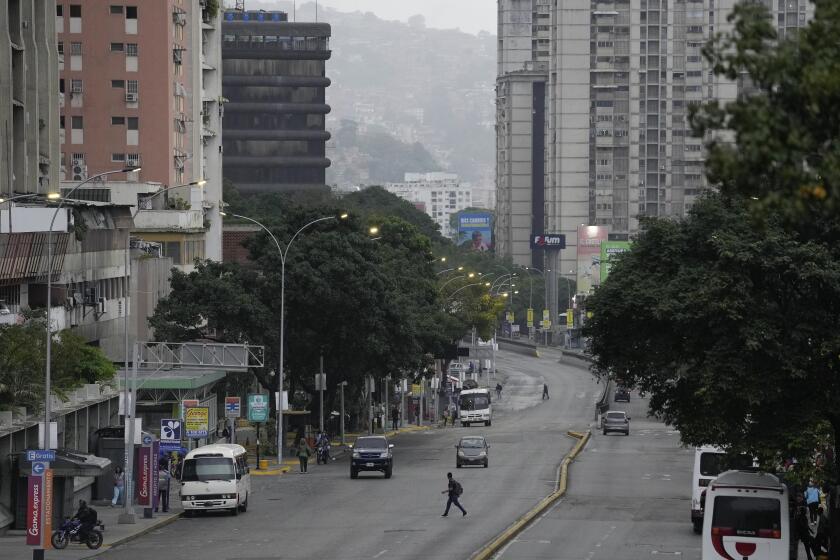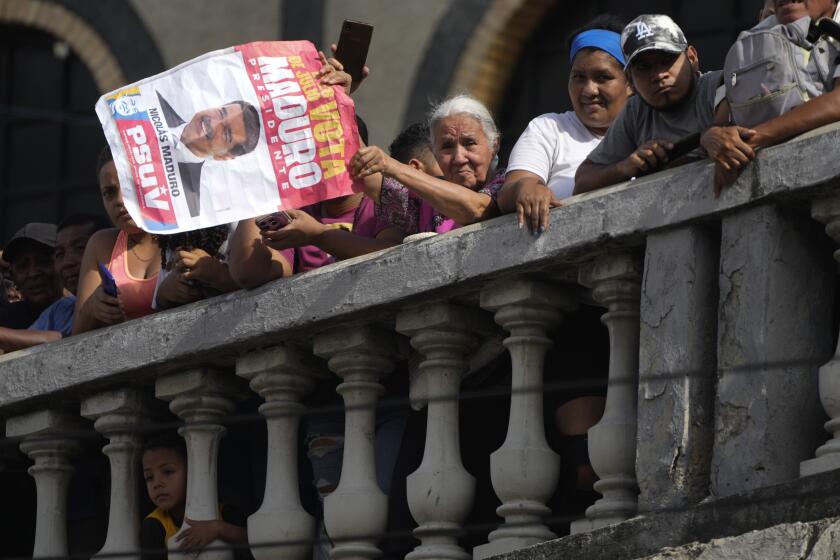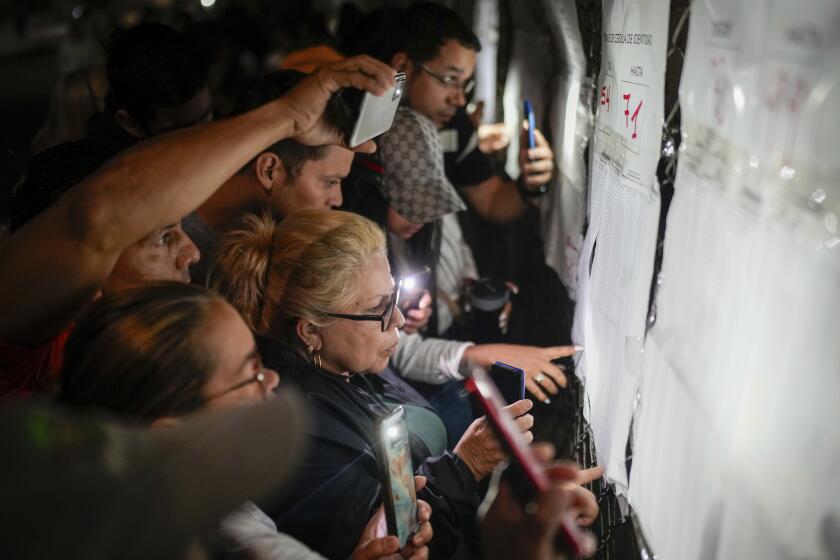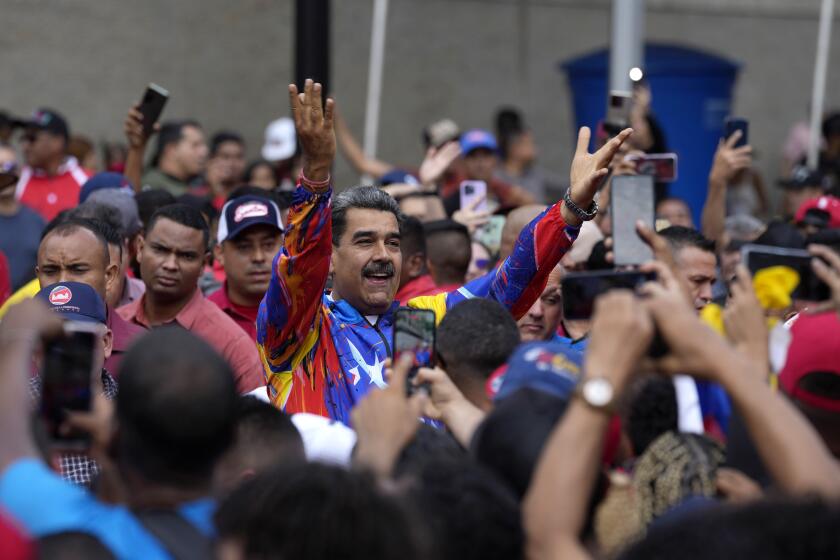Criticism mounts against Venezuelaâs Maduro and electoral council that declared him a victor
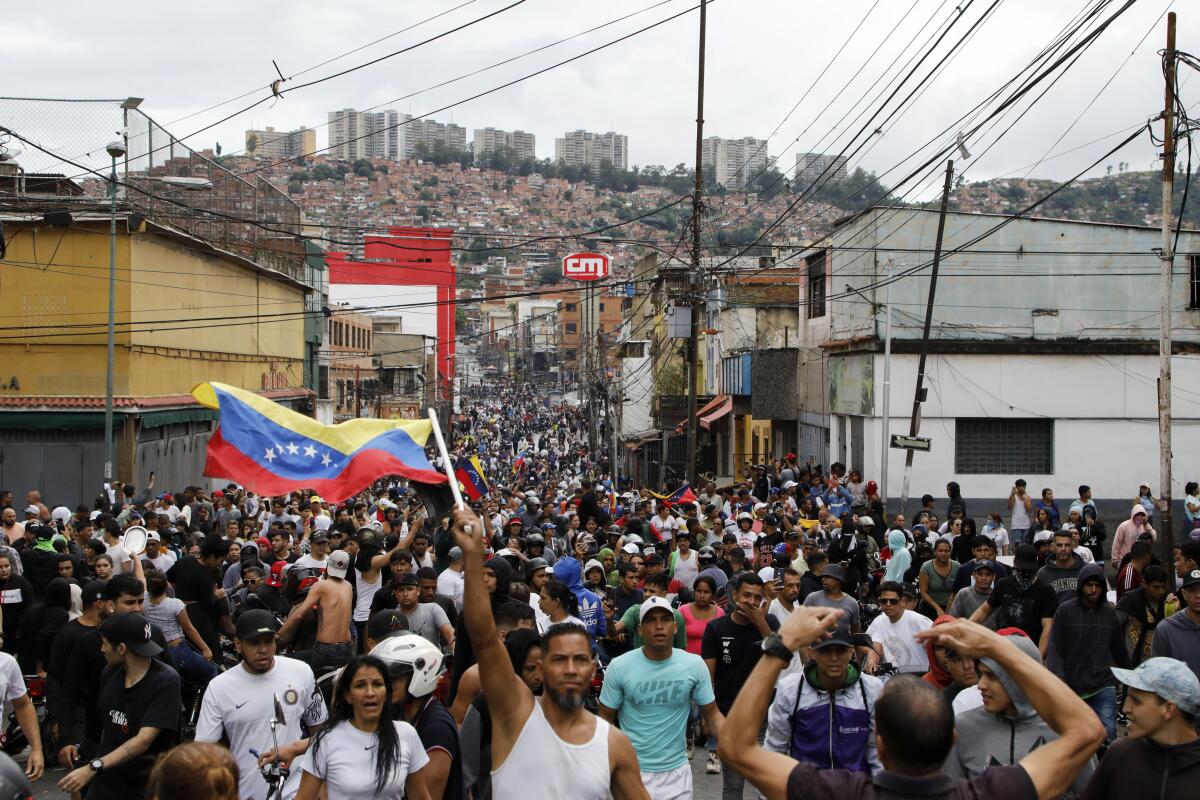
CARACAS, Venezuela â Criticism of Venezuelan President NicolĂĄs Maduro mounted Tuesday, a day after electoral authorities declared him the winner in a presidential election that the opposition claims to have won by a landslide.
Opposition leader Maria Corina Machado, standing atop a truck in the capital, Caracas, called on the National Electoral Council, which is loyal to the ruling party, to release tally sheets produced by every voting precinct, asking, âWhy donât they publish them?â
Machado said that the opposition coalition has obtained more than 84% of the tallies and that she is confident that opposition candidate Edmundo GonzĂĄlez was chosen to be the new president in Sundayâs election.
The National Electoral Council, which is loyal to President NicolĂĄs Maduroâs ruling party, announced his victory, handing him a third six-year term.
âThe only thing we are willing to negotiate is the peaceful transition,â Machado said as the crowd chanted: âWe have no fear!â
Machado and GonzĂĄlez urged their supporters, thousands of whom protested across the country on Monday, to remain calm and avoid violence.
âAnd remember this figure, when the tally sheets are counted, yours truly will have more than 8 million votes,â GonzĂĄlez said, flanked by his wife and Machado, who has been barred from running for political office for 15 years. âWe are going to begin the reconstruction of Venezuela. ... Enough of the persecution.â
The Organization of American States chastised Maduro for his governmentâs sustained repression of the opposition and lambasted the National Electoral Council not releasing the precinct-level results.
Venezuelaâs authoritarian president, NicolĂĄs Maduro, trails in polling. Would the longtime U.S. adversary accept defeat in Sundayâs election?
âThe worst form of repression, the most vile, is to prevent the people from finding solutions through elections,â the organization said in a statement. âThe obligation of each institution in Venezuela should be to ensure freedom, justice, and transparency in the electoral process.â
The organization, which has called an urgent meeting of its members to discuss Venezuelaâs election, even suggested that a new vote should take place to resolve the widely different results that electoral authorities and the opposition have presented. The do-over, the organization said, would require robust international observation.
Venezuela has the worldâs largest proven crude reserves and once boasted Latin Americaâs most advanced economy. But it entered into free fall after Maduro took the helm in 2013. The nation has been roiled by plummeting oil prices, widespread shortages and hyperinflation that led first to social unrest and then mass emigration.
The Office of the United Nations High Commissioner for Refugees, or UNHCR, estimates that more than 7.7 million Venezuelans have left the country since 2014, the largest exodus in Latin Americaâs recent history.
Unlike previous elections in Venezuela, supporters of the typically fractured opposition have agreed to organize, mobilize and support voters.
Thousands of Venezuelans took to the streets nationwide Monday to protest the results announced by the electoral council. As they marched, GonzĂĄlez announced that his campaign has the proof it needs to show he won.
âI speak to you with the calmness of the truth,â GonzĂĄlez said, as dozens of supporters cheered outside campaign headquarters in Caracas. âWe have in our hands the tally sheets that demonstrate our categorical and mathematically irreversible victory.â
The protests in Caracas were mostly peaceful, but when dozens of national police officers wearing riot gear blocked the caravan, a brawl broke out. Police used tear gas to disperse the protesters, some of whom threw stones and other objects at the officers.
Whether itâs NicolĂĄs Maduro who is chosen, or his main opponent, Edmundo GonzĂĄlez, the election will have ripple effects throughout the Americas.
A man fired a gun as the protesters moved through the cityâs financial district, but no one was injured.
However, Atty. Gen. Tarek William Saab said Tuesday that more than 700 protesters had been detained and that one officer died. Saab said a total of 48 military and police officers also were injured. Charges against some of the detainees will include terrorism, he said.
Those taken into custody included opposition leader Freddy Superlano, whom a bystander recorded Tuesday as armed individuals pulled him from a sports utility vehicle and forced him and two other men into another SUV. Superlano and one of the men can be seen throwing what appear to be their cellphones, which were then picked up by the people detaining them.
Long lines started to build Tuesday outside supermarkets and other stores in Caracas that sell food and essential supplies, in apparent anticipation of a prolonged period of demonstrations that could lead to food shortages.
The prospect of President NicolĂĄs Maduro winning reelection has prompted many Venezuelans to make plans to leave the country.
Mondayâs demonstrations followed an election that was among the most peaceful in the country in recent memory, reflecting hopes that Venezuela could avoid bloodshed and end 25 years of single-party rule. The winner would take control of an economy recovering from collapse and a population desperate for change.
âWe have never been moved by hatred. On the contrary, we have always been victims of the powerful,â Maduro claimed in a nationally televised ceremony. âAn attempt is being made to impose a coup dâetat in Venezuela again of a fascist and counterrevolutionary nature.â
âWe already know this movie and this time there will be no kind of weakness,â he added, saying that Venezuelaâs âlaw will be respected.â
In the port city of La Guaira, people toppled a statue of Maduroâs mentor and predecessor, Hugo Chavez, dragged it to the street and set it on fire during Mondayâs protests. Maduro unveiled the statue in 2017, and by Tuesday, all that remained was its base, littered with twisted rebar and broken concrete.
The National Electoral Council, which is loyal to President NicolĂĄs Maduroâs ruling party, announced his victory, handing him a third six-year term.
Machado told reporters that tally sheets from polling stations show Maduro received more than 2.7 million votes while GonzĂĄlez secured roughly 6.2 million. Meanwhile, the electoral council reported that Maduro and GonzĂĄlez garnered about 5.1 million and more than 4.4 million votes, respectively.
More than 9 million people cast ballots Sunday, according to figures released by the councilâs president, Elvis Amoroso.
The number of eligible voters in this election was estimated to be around 17 million. An additional 4 million Venezuelans are registered to vote, but they live abroad and many did not meet the registration requirements to cast ballots overseas.
Garcia Cano writes for the Associated Press. AP writer Joshua Goodman in La Guaira contributed to this report.
More to Read
Sign up for Essential California
The most important California stories and recommendations in your inbox every morning.
You may occasionally receive promotional content from the Los Angeles Times.
